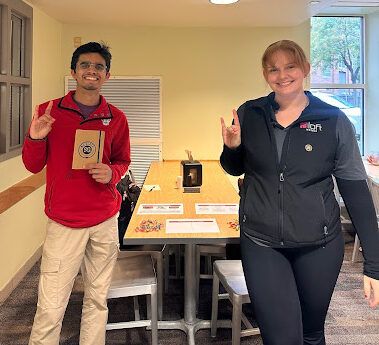NC State students and staff have identified a need for more opportunities for first-year and transfer students to build community on campus, and dining halls play an important role in the solution.
During the fall semester, a team of students from Student Government’s Department of Campus Services, along with administrative faculty and staff, piloted the Dining Student Support Program (DSSP), aimed at sparking conversation and fostering connection among students in the dining halls.

learn more about how students interact in
dining locations
The pilot project involved tabling by students and staff in both Clark and Fountain Dining Halls, where the team engaged with students to identify their concerns and ideas about campus community and involvement. Dave Johnson, associate director of student success, trained the tabling team on how to engage with students comfortably and effectively using the forward approach method.
While the dining halls are a place to gather and eat with friends for many, after tabling, the team realized that the majority of students in Clark Dining Hall chose to sit alone. NC State Student Senator Utkarsh Dave, one of the project’s student leaders, shared his thoughts on the issue.
“As students, we realized that more and more often we are sitting alone in the dining hall, which is a missed opportunity to connect with one another,” said Dave. “After the first two or three weeks of the semester, it can be difficult to stay connected with others and make new friends. We want to provide a solid support program for students to get to know one another and stay up to date on what’s going on across campus.”
Keith Smith, director of board operations and sustainability at NC State Dining, collaborated with the team to improve community building in the dining halls. Smith emphasizes the importance of providing a social balance in the dining halls.
“While some students come to the dining hall to escape and enjoy some alone time, others are looking to build connections, so we want to strike a balance between the two,” said Smith. “Building community on campus is super important, and dining halls and student centers often serve as spaces for socializing. We want the dining halls to be places where people have the chance and the resources they need to make those connections.”
The pilot project helped the team identify several areas of improvement for community building and student involvement on campus. Many students felt that there was a lack of information about clubs and other campus involvement opportunities after the first month of the semester. Furthermore, students shared that they were unaware of campus resources such as the events calendar and the Get Involved site.
“Going forward, we’ll be utilizing the billboards in dining halls to highlight upcoming campus events and clubs that are looking for more members,” said Dave. “We want diverse submissions so that we can cycle that info every few weeks and expose students to all kinds of social possibilities.”
The team has also discussed plans to help first-year students make better use of campus events, such Wolfpack Welcome Week, and will continue monthly tabling to keep communication open with students.
Dave shared his appreciation for Dining’s support in building community around the dining halls, explaining that recent Dining events such as ‘Clark in the Dark’ have been great opportunities for students to have fun together.
“The dining halls offer students important and reliable connections, both with their peers and with the Dining staff who always bring great energy and friendliness,” he said. “I have met several friends in the dining halls; sitting down to eat together is a great way to build friendships.”
